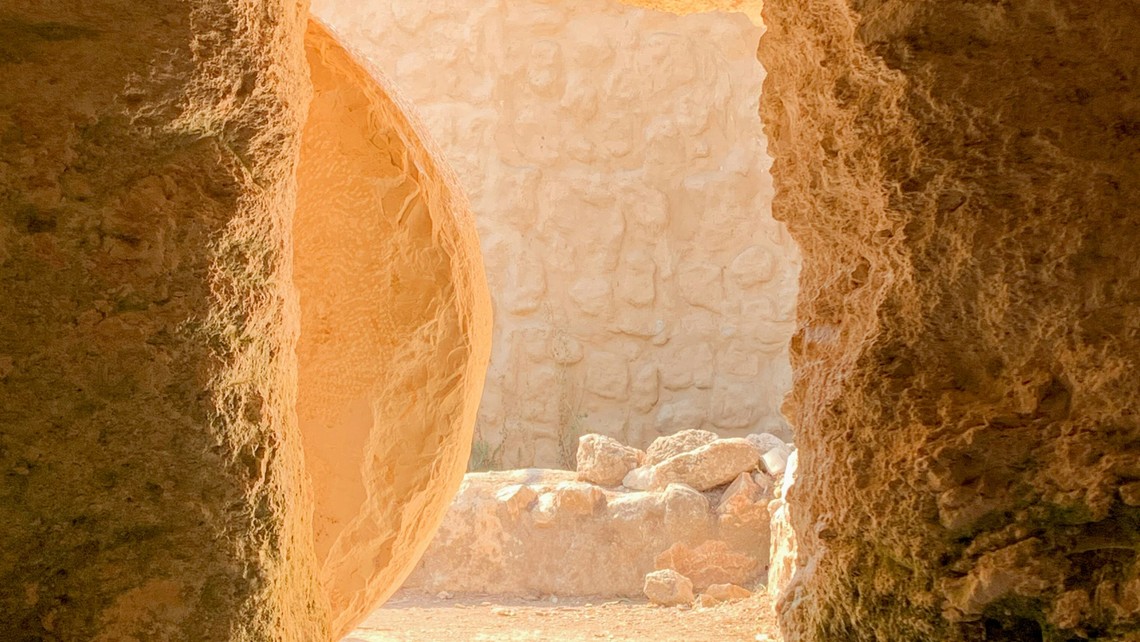
There is something both awe-inspiring and ominous about the path Jesus Christ freely chose to free man from the destruction of sin and an unholy death. Jesus came to save the lost through a sacrificial death. This act of sacrificial love, I argue, should leave a person with a sense of awe and wonder why someone would choose to die for a humanity that at first would revere him, then in a short matter of time scream for his execution. Even more, why would a Father offer his son in death for the salvation of souls he created in his image and likeness?
Man’s relationship with God, comprised of a body and soul, intellect and will, represents both a divine and physical reality. When man chooses to be united in this love, he emits a loving reciprocity, one limited in human nature, the other Divinely infinite. When Jesus begins to speak about his death after the raising of Lazarus and his interaction with Gentile Greeks, he reasserts the purpose of his role as the Son of God, referencing why he came, and exclaims, 'Father, glorify your name. '[1] When a thunderous voice came from heaven and responded, “I have glorified and will glorify it again.”[2]
Jesus explains to the crowd the nature of the voice that spoke. He takes this opportunity to explain that voice is for their sake, not his own, referencing the reason why the Son of God became man for the salvation of man. The novelty of this concept, as interpreted by the Gentile crowd, and the hatred of this concept as interpreted by the Jewish leaders, reveals the path necessary for salvation. The death Jesus describes he is about to endure is meant to remind the people that his death and resurrection are the reason he was sent by the Father. We witness Jesus’ obedience of faith toward his Father and the free desire to fulfill the Father’s wishes.
The Catechism reminds us that,
The desire to embrace his Father’s plan of redeeming love inspired Jesus’ whole life, for his redemptive passion was the very reason for his Incarnation.[3]
Jesus describes himself as the Son of Man, which the crowds display difficulty in understanding, though he used this language in his great Eucharistic discourse.[4] And warns the crowd that they have little time left to grasp the light of Christ until their intellect and will become darkened and overcome by the Devil himself. Jesus presents us with an awe-inspiring path of salvation through his death and resurrection and an ominous warning if we freely choose to reject his sacrifice on Calvary. The kingdom of God on earth is established through a path toward Calvary, a sacrificial path that defeats Satan. Though Jesus explains the necessity to live in the light of his Father in heaven, the crowds of Jews and Gentiles still refused to acknowledge and, worse, reject Jesus’ teachings. In what may be described as one last attempt to instruct the hearts and minds of those around him, he reminds everyone,
He who believes in me, believes not in me but in him who sent me. And he who sees me sees him who sent me. I have come as light into the world, that whoever believes in me may not remain in darkness.[5]
One may wonder how anyone could be in awe of the unjust death of a man who proclaimed to be the Son of God by the very people he purportedly came to save. The death of Christ at Calvary represents the reality of the act of unconditional love. What transpires at Calvary is an event that human reason alone could not comprehend. However, when the intellect and the will assent in faith to the reality of the events at Calvary, from Jesus’ suffering on the Cross, the forgiveness of the repentant thief, the spiritual directive by Christ to the beloved disciple John and his Mother Mary, we can begin to understand the awe-inspiring events that led to the death of Christ on the Cross at Calvary.
The Awe of Calvary is the radical love expressed by the Father through his Son Jesus Christ for the salvation of people who had called for his son to be killed. The death of Jesus on Calvary should remind us to embrace our spiritual Calvary and seek the death of sin and the desire for grace. The Awe of Calvary confirms the path of the resurrection of our souls on Easter and the proclamation of the gift of the resurrection through our baptismal promises and the joy of proclamation the Creed. The Awe of Cavalry reminds us that we are not disregarded by God but are indeed loved by him infinitely.
For the grace of God has appeared for the salvation of all men, training us to renounce irreligion and worldly passions, and to live sober, upright, and godly lives in this world, awaiting our blessed hope, the appearing of the glory of our great God and Savior Jesus Christ, who gave himself for us to redeem us from all iniquity and to purify for himself a people of his own who are zealous for good deeds. Declare these things; exhort and reprove with all authority. Let no one disregard you.[6]






